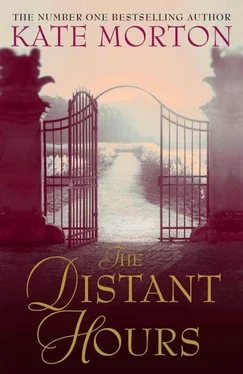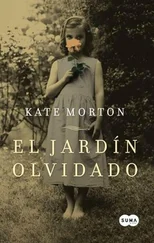I glanced back into the room’s black depths. ‘Does the light bulb not work?’
She regarded me a moment, then pulled a string and the bulb flared then dulled, settling at a low level, so that the shadows shifted. The light penetrated only far enough to illuminate a patch three feet in diameter. ‘I’d suggest you take the lamp too.’
I smiled grimly and found it easily enough, tucked around the corner just as she’d said it would be. There was a sloshing sound as I retrieved it, at which Percy Blythe said, ‘That’s promising. Not much good without paraffin inside.’ As I held the base, she removed the glass flue, fiddled with a coin-sized dial to lengthen the fabric wick before lighting it. ‘I’ve never enjoyed the smell,’ she said, restoring the flue. ‘It signals bomb shelters to me; ghastly places. Filled with fear and helplessness.’
‘And safety, I’d have thought. Comfort?’
‘Perhaps for some, Miss Burchill.’
She said no more, and I found occupation familiarizing myself with the thin metal handle at the top, testing it to make sure it would hold the lamp’s weight.
‘No one’s been inside for an age,’ said Percy Blythe. ‘There’s a desk at the back. You’ll find the notebooks in boxes beneath. I wouldn’t imagine that they’re in good order: Daddy died during the war; there were other things to contend with. No one had much time for filing.’ She said it defensively, as if I might be about to take her to task for slovenly housekeeping.
‘Of course.’
A flicker of doubt crossed her face, but dissolved when she coughed heavily into her hand. ‘Well then,’ she said, once recovered. ‘I’ll be back in an hour.’
I nodded, keen suddenly that she might stick around just a little longer. ‘Thank you,’ I said, ‘I’m really very grateful for the opportunity-’
‘Be careful with the door. Don’t let it close behind you.’
‘OK.’
‘It’s self-locking. We lost a dog that way.’ Her lips distorted, a grimace that didn’t quite become a smile. ‘I’m an old lady, you know. I can’t be relied upon to remember where I left you.’
The room was long and thin, and low brick arches spanned the width, holding up the ceiling. I clutched the lamp tightly, lifting it out ahead of me so that light flickered against the walls as I took slow, cautious steps deeper inside. Percy had told the truth when she said that no one had been inside for a long time. The room bore an unmistakable signature of stillness. There was silence, too, church silence and I had the uncanny sense that something greater than me was watching.
You’re being fanciful , I told myself sternly. There is no one here but you and the walls . But that was half my problem. These weren’t just any walls, these were the stones of Milderhurst Castle, beneath whose skin the distant hours were whispering, watching. The further into the room I went, the more aware I was of a strange, heavy feeling. A depth of aloneness – loneliness, almost – cloaking me. It was the dark, of course, my recent interaction with Saffy, Juniper’s melancholy story.
But this was my one and only opportunity to see Raymond Blythe’s notebooks. I had only a single hour, and then Percy Blythe would be back to collect me. Chances were, I wouldn’t be permitted a second visit to the muniment room, so it was as well to pay close attention now. I made a mental checklist as I walked: wooden filing cabinets lining both walls; above them – I lifted the lamp to see – maps and architectural plans of all vintages. A little further along was hung a collection of tiny framed daguerreotypes.
It was a series of portraits, the same woman in each: in one she was reclined along a chaise longue in a state of some déshabillé, in the others she was facing the camera directly, Edgar Allan Poe-style, dressed in a high-necked Victorian collar. I leaned closer, brought my lamp high to observe the face within the bronze, blowing once to scatter some of the layered dust. I felt an odd coldness creep up my spine as the face was revealed. She was beautiful, but in a vaguely nightmarish way. Smooth lips; perfect, poreless skin stretched taut along high cheekbones; teeth large and polished. I held the lamp near enough to read the name engraved in cursive writing at the bottom of the picture: Muriel Blythe . Raymond’s first wife, the twins’ mother.
How strange that all her portraits had been relegated to the muniment room. Had it been the result of Raymond Blythe’s grief, I wondered, or the jealous decree of his second wife? Whatever the case, and although I can’t say what made me so pleased to do it, I shifted the lamp then, casting her back into darkness. There wasn’t time to explore each and every hollow of the room. I resolved to find Raymond Blythe’s notebooks, absorb as much from them as I could in the hour allotted, then leave behind this strange, stale place. I held the lamp before me and kept on walking.
But then the pictures on the walls gave way to shelves, stretching from floor to ceiling, and despite myself I slowed. It was like being inside a treasure trove; all manner of items had been stacked along them: books – lots of books – vases and Chinese porcelain, and even crystal jugs. Precious things, from what I could tell, not junk or detritus. What they were doing, languishing on shelves in the muniment room, I could not begin to guess.
Beyond them was something interesting enough to make me stop: a collection of forty or fifty boxes, all of the same size, covered in pretty paper – floral for the most part. There were little labels on some of them and I went close enough to read one: Heart Reclaimed : a novel by Seraphina Blythe . I lifted the lid and peeked inside: a stack of paper with typewritten text all over it, a manuscript. I remembered Mum telling me that the Blythes had all been writers, all except Percy. I held the lamp higher so that I could take in the entire collection of boxes, smiling in wonder. These were Saffy’s stories. She was so prolific. It oppressed me, in some way, to see them all huddled down here together: stories and dreams, people and places invested at one time with great energy and industry, only to be left in the dark over years to turn back into dust. Another label read Marriage to Matthew de Courcy . The publisher in me couldn’t help it: I lifted the lid and pulled the papers from inside. This one didn’t contain a manuscript, though; it was a collection of assorted papers – research, I supposed. Old sketches – wedding dresses, floral arrangements – newspaper clippings describing various society weddings, scribbled notes as to orders of service, and then, further down, a 1924 notice of the engagement of Seraphina Grace Blythe and Matthew John de Courcy.
I set the papers down. This was research, but not for a novel. This box contained the planning for Saffy’s own wedding that never was. I put the lid back on and stepped away, guilty suddenly for my intrusion. It struck me then that every item in this room was the remnant of a bigger story, the lamps, the vases, the books, the duffel bag, Saffy’s floral boxes. The muniment room was a tomb, just like those in ancient times. A pharaoh’s dark, cool tomb where precious things went to be forgotten.
By the time I reached the table at the very end, I felt as if I’d walked a marathon through Alice’s Wonderland. It was a surprise, then, when I turned around, to see that the swaying light bulb, the door – carefully propped open with a wooden box – was only forty-five feet or so behind me. I found the notebooks just where Percy had said they’d be and, just as she’d said, piled into boxes, as if someone had walked along Raymond Blythe’s study shelves and desk, swept everything in together, then left them here. I understood that there were other concerns during the war; nonetheless, it seemed odd that neither of the twins had found time to return in the decades since. Raymond Blythe’s notebooks, his journals and letters, deserved to be on display in a library somewhere, protected and valued, available for scholars to access for many years to come. Percy, in particular, I’d have thought, with her keen eye to posterity would have sought to protect her father’s legacy.
Читать дальше












